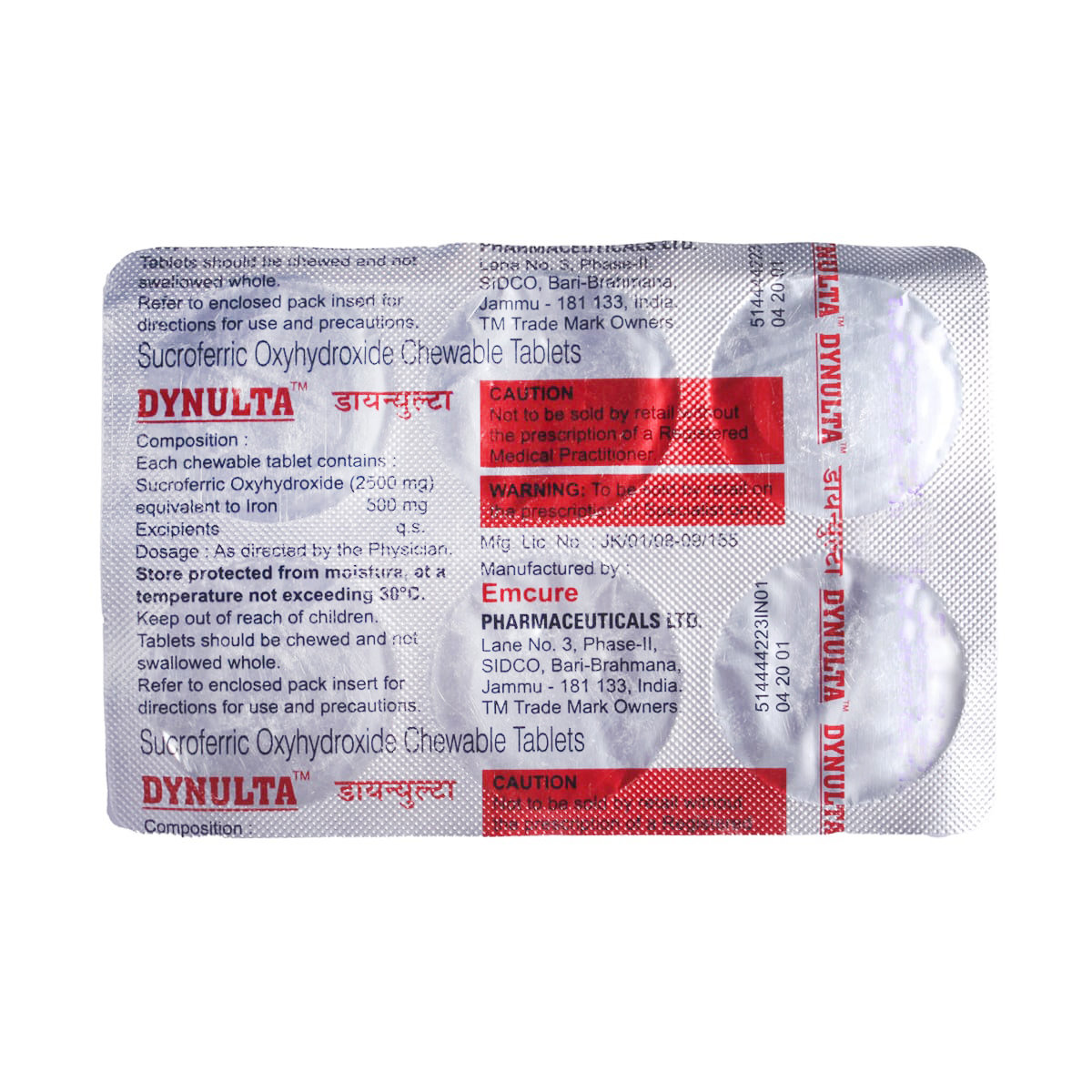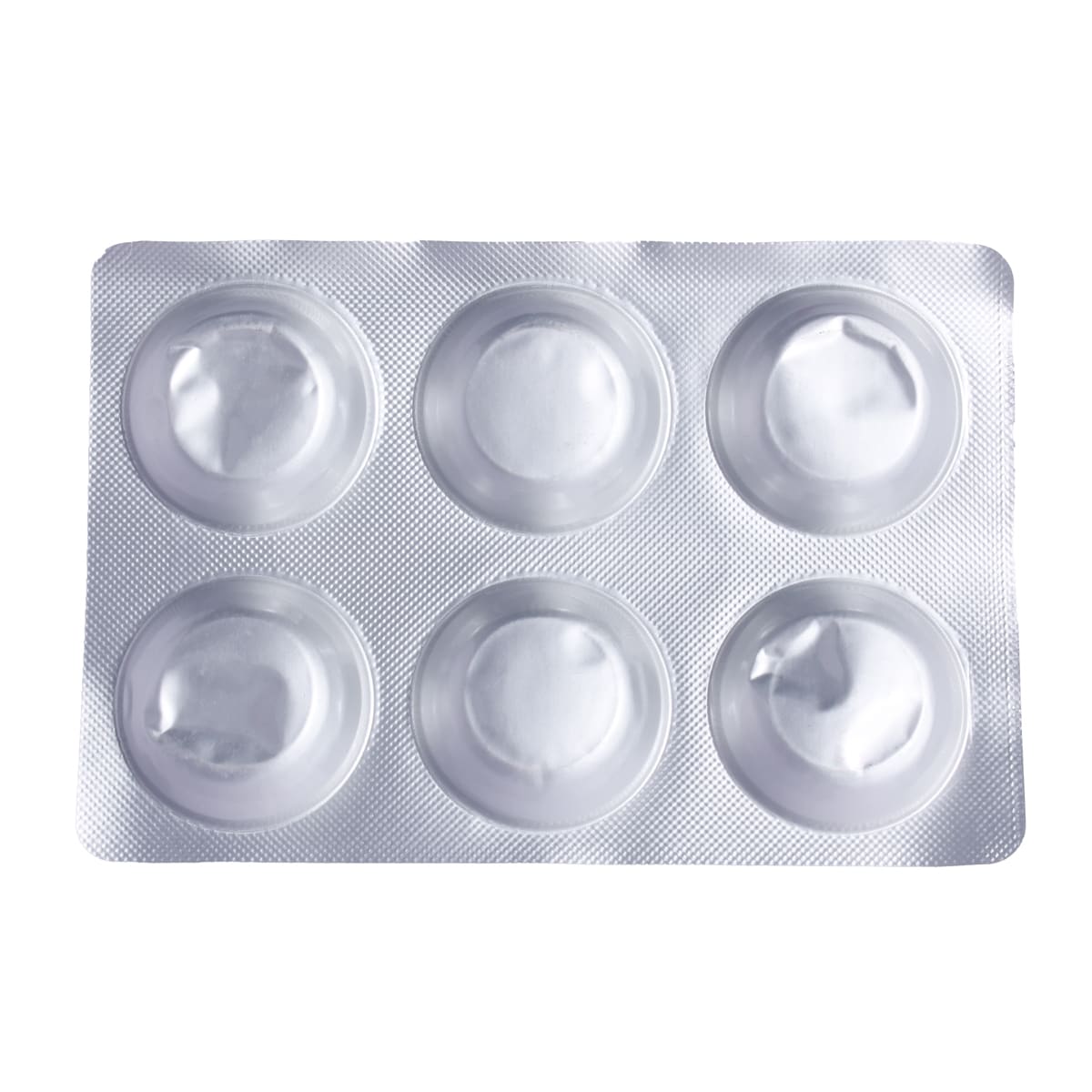Dynulta Tablet 6's


MRP ₹316.5
(Inclusive of all Taxes)
₹38.0 Cashback (12%)
Dynulta Tablet is a mineral supplement used in the treatment of high potassium levels in the body. It helps control serum phosphorus levels in adult chronic kidney disease patients on haemodialysis or peritoneal dialysis. Common side effects include diarrhoea, nausea, vomiting, constipation, and indigestion.
Know Your Delivery Time
Provide Delivery Location

Secure Payment

India's Most Trusted Pharmacy

Genuine Products
Composition :
Manufacturer/Marketer :
Consume Type :
Return Policy :
Expires on or after :
About Dynulta Tablet
Dynulta Tablet belongs to the class of medications called mineral supplements, indicated for controlling serum phosphorus levels in adult chronic kidney disease patients on haemodialysis or peritoneal dialysis.
Dynulta Tablet contains 'sucroferric oxyhydroxide'. It helps to lower phosphate levels in the blood and prevents complications caused by high phosphate levels in the blood, especially in dialysis patients who are unable to eliminate excess phosphate levels.
Dynulta Tablet can cause side effects such as diarrhoea, nausea, vomiting, constipation, and indigestion. These side effects are not universal and vary from person to person. Please consult your doctor if you experience any of the side effects persistently.
Do not take Dynulta Tablet if you are allergic to any of the contents, if you have/had haemochromatosis, or iron overload disorder. Before using this medication, inform your doctor of any medical issues you may have. Consult your doctor if you are pregnant or breastfeeding.
Uses of Dynulta Tablet
Dynulta Tablet is used in the treatment of Hyperphosphatemia (high phosphate levels in the blood). The detailed uses of Dynulta Tablet are as follows:
- Treats Hyperphosphatemia: Dynulta Tablet helps reduce high phosphate levels in the blood in adults with chronic kidney disease (CKD), especially those undergoing haemodialysis or peritoneal dialysis.
- Prevents Complications of High Phosphate levels: By lowering and maintaining phosphate levels in the blood, Dynulta Tablet helps prevent health issues such as bone disorders and cardiovascular complications.

Have a query?
Directions for Use
- Dynulta Tablet can be taken with or without food.
- Follow your doctor's instructions regarding the dosage and duration.
- Chew the tablet thoroughly and swallow.
- Do not swallow the medicine as a whole.
Medicinal Benefits
- Dynulta Tablet helps control and lower high serum phosphorus levels in adults with chronic kidney disease (CKD) on haemodialysis or peritoneal dialysis.
- It prevents complications caused by hyperphosphatemia (excess phosphate in the blood), such as bone and heart problems.
- It helps maintain normal phosphate balance, which is important for bone strength and overall metabolic health.
- Dynulta Tablet reduces the risk of bone weakening and joint pain associated with high phosphate levels.
- It supports the management of mineral and bone disorders in CKD patients.
- It improves overall treatment outcomes and quality of life in dialysis patients by preventing phosphate buildup.
How Dynulta Tablet Works
Storage
- If you are experiencing fecal discoloration as a side effect of medication, it is important to talk to your doctor. They can help you determine the cause of the discoloration and recommend the best course of treatment.
- Stay hydrated by drinking plenty of fluids to prevent constipation.
- Adopt a balanced diet rich in fibre to regulate bowel movements and prevent constipation.
- Eat less or stay away from foods like beets, carrots, and leafy greens that can temporarily change the colour of your stool.
- Eat less dark-coloured foods, such as black liquorice or blueberries.
- Inform Your Doctor: Notify your doctor immediately about your diarrhoea symptoms. This allows them to adjust your medication or provide guidance on managing side effects.
- Stay Hydrated: Drink plenty of fluids to replace lost water and electrolytes. Choose water, clear broth, and electrolyte-rich drinks. Avoid carbonated or caffeinated beverages to effectively rehydrate your body.
- Follow a Bland Diet: Eat easy-to-digest foods to help firm up your stool and settle your stomach. Try incorporating bananas, rice, applesauce, toast, plain crackers, and boiled vegetables into your diet.
- Avoid Trigger Foods: Steer clear of foods that can worsen diarrhoea, such as spicy, fatty, or greasy foods, high-fibre foods, and dairy products (especially if you're lactose intolerant).
- Practice Good Hygiene: Maintain good hygiene to prevent the spread of infection. To stay healthy, wash your hands frequently, clean and disinfect surfaces regularly, and avoid exchanging personal belongings with others.
- Take Anti-Diarrheal Medications: If your doctor advises, anti-diarrheal medications such as loperamide might help manage diarrhoea symptoms. Always follow your doctor's directions.
- Keep track of your diarrhoea symptoms. If they don't get better or worse or are accompanied by severe stomach pain, blood, or dehydration signs (like extreme thirst or dark urine), seek medical help.
- Inform your doctor about the nausea and discuss possible alternatives to the medication or adjustments to the dosage.
- Divide your daily food intake into smaller, more frequent meals to reduce nausea.
- Opt for bland, easily digestible foods like crackers, toast, plain rice, bananas, and applesauce.
- Avoid certain foods that can trigger nausea, such as fatty, greasy, spicy, and smelly foods.
- Drink plenty of fluids, such as water, clear broth, or electrolyte-rich beverages like coconut water or sports drinks.
- Use ginger (tea, ale, or candies) to help relieve nausea.
- Get adequate rest and also avoid strenuous activities that can worsen nausea.
- Talk to your doctor about taking anti-nausea medication if your nausea is severe.
- Record when your nausea occurs, what triggers it, and what provides relief to help you identify patterns and manage your symptoms more effectively.
What if I have taken an overdose of Dynulta Tablet
Drug Warnings
- Do not take Dynulta Tablet if you are allergic to any of the contents, if you have/had haemochromatosis, or iron overload disorder.
- Notify your doctor if you have/had inflammation of the peritoneum, stomach/intestinal surgery, stomach and/or liver problems.
- Before using this medication, tell your doctor about any health complications you have.
- Inform your doctor if you are taking any other medications.
- Consult your doctor if you are pregnant or nursing.
Drug-Drug Interactions
Drug-Drug Interactions
Login/Sign Up
Drug-Food Interactions
Drug-Food Interactions
Login/Sign Up
Diet & Lifestyle Advise
- Reduce the amount of phosphorus in your foods and beverages.
- Eat low phosphorus foods such as sourdough bread, corn or rice cereals, cream of wheat, unsalted popcorn and some light-coloured sodas & lemonade.
- Avoid high phosphorus foods, including bran cereals, oatmeal, nuts, sunflower seeds, whole-grain bread and dark-coloured colas.
Habit Forming
Therapeutic Class
All Substitutes & Brand Comparisons
Alcohol
Caution
It is not recommended to drink alcohol while taking Dynulta Tablet because it may cause unpleasant side effects.
Pregnancy
Caution
Please seek advice from a healthcare professional. There are no adequate and well-controlled studies on pregnant women. Your doctor will prescribe only if the benefits outweigh the risks.
Breast Feeding
Caution
Consult your healthcare professional as there is no substantial research yet on the use of Dynulta Tablet in breastfeeding/nursing mothers.
Driving
Caution
It is unknown whether Dynulta Tablet affects driving ability. Do not drive or operate machinery if you have any symptoms that impair your ability to concentrate or react.
Liver
Caution
Consult your doctor if you have liver problems. Your doctor will prescribe only if the benefits outweigh the risks.
Kidney
Consult your doctor
Consult your doctor if you have kidney problems.
Children
Caution
The safety and efficacy of Dynulta Tablet in children below 2years have not been established.
Heart
Consult your doctor
Limited information is available on the use of Dynulta Tablet in individuals with heart problems. Please consult your doctor. Your doctor will prescribe only if the benefits outweigh the risks.
Geriatrics
Consult your doctor
Dynulta Tablet should be given to elderly patients only if prescribed by a doctor. If you have any concerns, please consult your doctor. Dose adjustment may be required based on their health condition.
FAQs
Dynulta Tablet belongs to the class of medications called mineral supplements, indicated for controlling serum phosphorus levels in adult chronic kidney disease patients on haemodialysis or peritoneal dialysis.
Dynulta Tablet helps to lower phosphate levels in the blood and prevents complications caused by high phosphate levels in the blood, especially in dialysis patients who are unable to eliminate excess phosphate levels.
No, it is a prescribed medication primarily used to keep serum phosphorus levels under control in adult chronic kidney disease (CKD) patients on haemodialysis (HD) or peritoneal dialysis (PD). Taking it on your own can result in undesirable side effects.
Dynulta Tablet may cause your stools to turn black. This could be an indication of bleeding in the digestive tract. Inform your doctor if you notice black stools, tiredness and breathlessness.
Diarrhoea could be an unintended consequence of Dynulta Tablet. If you have diarrhoea, drink plenty of fluids to avoid dehydration. If you have severe diarrhoea or find blood in your stools, consult your physician.
Country of origin
Manufacturer/Marketer address
Disclaimer
Author Details
We provide you with authentic, trustworthy and relevant information
Buy best Genito Urinary products by
Cipla Ltd
Sun Pharmaceutical Industries Ltd
Intas Pharmaceuticals Ltd
Leeford Healthcare Ltd
Ipca Laboratories Ltd
Dr Reddy's Laboratories Ltd
Lupin Ltd
Alkem Laboratories Ltd
Mankind Pharma Pvt Ltd
Demorbus India Pvt Ltd
Corona Remedies Pvt Ltd
Zydus Healthcare Ltd
Msn Laboratories Pvt Ltd
Overseas Health Care Pvt Ltd
RPG Life Sciences Ltd
La Renon Healthcare Pvt Ltd
Samarth Life Sciences Pvt Ltd
Ignyx Pharmaceuticals
Alembic Pharmaceuticals Ltd
Macleods Pharmaceuticals Ltd
Micro Labs Ltd
Fourrts India Laboratories Pvt Ltd
Aristo Pharmaceuticals Pvt Ltd
Emcure Pharmaceuticals Ltd
Hetero Drugs Ltd
Tas Med India Pvt Ltd
Tppl Pharmaceuticals Pvt Ltd
Zydus Cadila
Medrhans Pharmaceuticals Pvt Ltd
Golden Square Lab Pvt Ltd
Meditrex Pharma
Renspur Healthcare Pvt Ltd
Alniche Life Sciences Pvt Ltd
Knoll Healthcare Pvt Ltd
Merynova Life Sciences India Pvt Ltd
Zycris Healthcare
Ajanta Pharma Ltd
Elder Pharmaceuticals Ltd
Lividus Pharmaceuticals Pvt Ltd
Septalyst Lifesciences Pvt Ltd
Talohsty Medmark Pvt Ltd
Delvin Formulations (P) Ltd
Morepen Laboratories Ltd
Nephurocare Pharma Pvt Ltd
Neuten HealthCare
Prevego Healthcare & Research Pvt Ltd
Stadmed Pvt Ltd
Steris Healthcare
Walron Health Care Pvt Ltd
Walter Bushnell
Aar Ess Remedies Pvt Ltd
Amps Biotech Biotech Pvt Ltd
East West Pharma India Pvt Ltd
Globus Remedies Ltd
Intra Life Pvt Ltd
Kiosence Health Care Pvt Ltd
Pfizer Ltd
Redmed Medical Services
Tripada Healthcare Pvt Ltd
Biokindle Lifesciences Pvt Ltd
Calren Care Lifesciences Pvt Ltd
Hetero Healthcare Pvt Ltd
Himeros Pharmaceuticals Pvt Ltd
Indoco Remedies Ltd
Modi Mundipharma Pvt Ltd
Ppp Pharmaceuticals
Qren Life Sciences Pvt Ltd
Redmax Pharma
TTK Healthcare Ltd
Votary Laboratories (India) Ltd
Albus Healthcare Pvt Ltd
Alteus Biogenics Pvt Ltd
Euniche Life Sciences
Fibovil Pharmaceuticals Pvt Ltd
MISAE LIFE SCIENCES
Megma Healthcare Pvt Ltd
Olcare Laboratories Pvt Ltd
Oxygen Pharma Care Pvt Ltd
Primus Remedies Pvt Ltd
Rencord Life Sciences Pvt Ltd
Unipark Biotech Pvt Ltd
Wellshark Pharmaceuticals Pvt Ltd
Zenith Formulations
Zenska Life Sciences Pvt Ltd
Abbott India Ltd
Adelmo Healthcare
Akumentis Healthcare Ltd
Ameya Pharmaceuticals & Chemicals Pvt Ltd
Chemo Biological Ltd
Chemo Healthcare Pvt Ltd
Elio Bio Care Lifesciences Pvt Ltd
Fidus Healthcare Llp
Hospimax Healthcare Pvt Ltd
Jagsam Pharma
Koye Pharmaceuticals Pvt Ltd
Lia Life Sciences Pvt Ltd
Maaah Pharmaceuticals Pvt Ltd
Miotic Pharma
Neovae Biomedics Pvt Ltd
Panacea Biotec Ltd
Recommended for a 30-day course: 10 Strips





